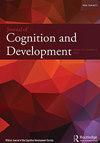A First Theoretical Model of Self-Directed Cognitive Control Development
IF 1.6
2区 心理学
Q3 PSYCHOLOGY, DEVELOPMENTAL
引用次数: 1
Abstract
ABSTRACT Cognitive control (also referred to as executive functions) corresponds to a set of cognitive processes that support the goal-directed regulation of thoughts and actions. It plays a major role in complex activities and predicts later academic achievement. Importantly, while growing up, children are progressively transitioning from engaging cognitive control in an externally driven fashion, i.e., relying on external guidance, to exerting it self-directedly, i.e., autonomously determining when and how to engage it. Although growing self-directedness in cognitive control engagement is critical to autonomy gains during childhood, relatively little is known about the underlying cognitive mechanisms. Incorporating previous main proposals in cognitive control development, we propose that self-directed control development is driven by the ability to identify relevant goals, facilitated through accumulated knowledge on how to engage cognitive control with age. Importantly, we argue that there are two key processes that are part of successful goal identification: context-tracking and goal selection. We argue that most developmental changes are linked to context-tracking as the demands on this process are particularly high in self-directed situations. We then derived main predictions from this theoretical model as well as promising future directions.自我定向认知控制发展的第一个理论模型
摘要认知控制(也称为执行功能)对应于一组认知过程,支持以目标为导向的思想和行动调节。它在复杂的活动中发挥着重要作用,并预示着以后的学术成就。重要的是,在成长过程中,儿童正在从以外部驱动的方式参与认知控制,即依赖外部指导,逐渐过渡到自我指导,即自主决定何时以及如何参与。尽管在认知控制参与中培养自我指导性对儿童期获得自主性至关重要,对潜在的认知机制知之甚少。结合先前关于认知控制发展的主要建议,我们提出,自我导向的控制发展是由识别相关目标的能力驱动的,通过积累关于如何随着年龄的增长进行认知控制的知识来促进。重要的是,我们认为有两个关键过程是成功识别目标的一部分:上下文跟踪和目标选择。我们认为,大多数发展变化都与情境跟踪有关,因为在自我导向的情况下,对这一过程的要求特别高。然后,我们从这个理论模型中得出了主要的预测以及有前景的未来方向。
本文章由计算机程序翻译,如有差异,请以英文原文为准。
求助全文
约1分钟内获得全文
求助全文
来源期刊

Journal of Cognition and Development
Multiple-
CiteScore
4.00
自引率
0.00%
发文量
29
期刊介绍:
The Journal of Cognition and Development is the official journal of the Cognitive Development Society (CDS). Some CDS members are concerned with basic research or theory; others focus on policy issues and practical applications. The range of interests includes cognitive development during all stages of life, and we seek to understand ontogenetic processes in both humans and nonhumans. Finally, their interests encompass typical as well as atypical development, and we attempt to characterize both biological and cultural influences on cognitive change and continuity.
 求助内容:
求助内容: 应助结果提醒方式:
应助结果提醒方式:


